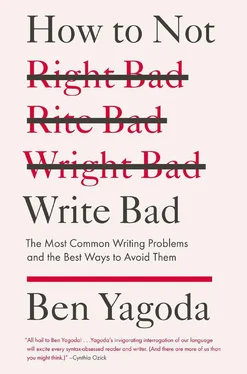3. WRONG WORD
The spell-check errors and the eggcorns get the headlines and the laughs, but a more common and insidious problem is word choices that are off, sometimes by just a hair, sometimes by a Howard Stern wig and a full beard. Too often, reading student papers is like listening to a routine by Norm Crosby, the malapropeptic comedian who referred to having a good “rappaport” with a like-minded friend. Here are some real-life examples, with what I guess to be the right word in parenthesis:
On the Mason-Dixon Line: An Anthology of Contemporary Delaware Writers exemplifies (consists of —but even better would be is) a collection of essays, poems, and short stories by Delaware’s own authors.
Of the many things the students aspired (expected) to see, a terrorist attack was not one of them.
…the drop in candidates can be accredited (attributed) to …
Stories about the hurricane invade (dominate) the entire first section of the newspaper.
No one can blame (accuse) John Henrickson of being an apathetic college student.
The vast proportion (majority) of students is enrolled in the College of Arts and Science.
She said it was her father’s participation in the army which possessed (inspired, motivated) her to join the College Republicans.
Then there’s this one, which seems to encapsulate all the problems students are having:
The land, which is currently occupied with (by) older, run-down homes, will be rejuvenated (I’m not sure what the right word is — I just know that rejuvenated isn’t it) to fit the positive stigma (image) that the city manager (is trying) to uphold.
How to fix or avoid the problem? Again, it’s a toughie. There’s not much more you can do than undertake a close scrutiny of your writing, dictionary in hand. Be very wary of the online thesaurus. If you are having problems with word choice, you also might do well to find a smart, well-read friend and agree to read each other’s work.
One common wrong-word subcategory happens when writers have a decent idea in mind and start it off well, but aren’t rigorous about matching up their subjects and verbs. Consider:
[ Investigations at that time did not uncover the source of the outbreak, and the number of infections soon ceased. ]
Well, infections may have ceased, but numbers don’t cease. The fix is simple:
Investigations at that time did not uncover the source of the outbreak, and infections soon ceased.
Similarly, in
[ In the past two years the national unemployment rate has doubled and is at a high that falls second to only one other peak in history, occurring in the 1980s. ]
the word fall doesn’t really belong and got the writer in trouble. Various adjustments could be made to spruce the sentence up, but at the very least you can say:
In the past two years, the national unemployment rate has doubled; it’s now at a high that is second to only one other peak in history, occurring in the 1980s.
D. Grammar
As I suggested in the introduction, grammatical mistakes are overrated — by which I mean they get a disproportionate amount of attention as a source of bad writing. By definition, native speakers of a language know its grammar. No American above the age of four would say, “Him gave the book to I.” However, we might say, “Peter and him went to the movie with Sarah and I,” which is nonstandard, or, to put it bluntly, wrong.
That, like virtually every other common grammatical “mistake,” is an instance of vernacular or colloquial expressions clashing with the standards of formal or public writing and usage. The mistakes fall into three categories: Sanitized, Skunked , and Still Wrong .
1. SANITIZED
This refers to usages that at one time were verboten but, over the decades and sometimes centuries, have become acceptable to everybody, or just about everybody. In fact, in most of these cases, the formerly “correct” usage now sounds either too formal or just plain weird. However, you may have a supervisor, editor, or teacher who sticks to the old-fashioned dicta. If so, he or she, unfortunately, is the boss and nothing I say or write can change that. Still, you have my permission to wave this section in the air and protest that you read in a book that it’s perfectly acceptable to:
a. End a Sentence with a Preposition
Who are you going to the movies with? (But see III.C.7.)
b. Use Who Instead of Whom in the Objective Case
Who are you going to the movies with?
The exception is immediately following a preposition: To whom should I send the customer-satisfaction survey?
c. Use Objective Rather than Subjective Pronouns in Comparisons, Following the Verb to Be , and in First-Person Plural
They have a bigger house than us. (Alternatively: than we do. )
Hello, it’s me.
We are all at the mercy of Mother Nature. But especially us astronomers.
d. Judiciously Split Infinitives
To avoid damaging the wall, you carefully have to carefully hold the picture hook and hammer it in.
e. (And Similarly) Break up a Compound Verb with an Adverb
He has frequently woken up frequently in the morning with no idea where he spent the night.
f. Use Like (I)
This little word, depending on the way it’s used, can be alternately sanitized, skunked, and still wrong. (And that’s not even getting into the way young people famously use it in conversation, as a filler [“I’m, like, tired”] or indicator of attribution [“He was like, ‘Why aren’t you going to the concert?’”]. Even young people know enough not to use it this way in formal writing.)
It wasn’t necessarily always the case, but it’s now okay to use like:
As a synonym for such as.
We read authors like Hemingway, Faulkner, and Fitzgerald.
To introduce a clause where a verb is omitted.
He takes to engineering like a duck [takes] to water.
He speaks French like a native [does].
It has never been wrong or even suspect to use like in a sentence like:
Like Paris, Rome has an almost unlimited number of world-class restaurants.
However, some people are gun-shy about like and engage in the hoity toity lingo that’s called “hypercorrection.”
[ In common with Paris, Rome has an almost unlimited number of world-class restaurants. ]
Actually, in common with is called for in only one situation: sentences like Bill and Paul have lot in common.
g. Use a Plural Verb with a Collective Noun
A number of objections comes come to mind.
In the above sentence, the plural come is better than the singular comes, even though (singular) number is ostensibly the subject of the sentence. That’s because the emphasis is on objections. By the same logic, if the emphasis is on the singular collective, the singular verb is preferable:
Just one battalion of soldiers were was sent to the front.
A bucket of worms were was on top of the bench.
He was one of the employees who was were given an award at the ceremony.
Читать дальше












